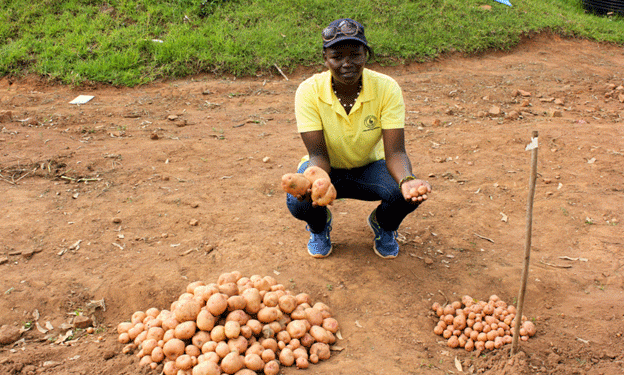Potatoes are the second most important food crop in Kenya after maize, contributing significantly to household income, food security, and national GDP. Yet, despite the crop’s economic significance, most Kenyan farmers still struggle to access certified potato seeds—an issue that threatens productivity, profitability, and long-term sustainability.
At the heart of the problem is the limited supply and high cost of certified seed potatoes. Speaking at the Kenya Agricultural and Livestock Research Organization (KALRO) Potato Research Centre in Tigoni, Kiambu County, farmers voiced their frustration. Sammy Rotich, a farmer from Kuresoi, Nakuru County, highlighted how the Kenya Seed and Plant Varieties Act restricts the sale of uncertified seeds, further aggravating the supply problem. Without access to affordable certified seeds, farmers are often left with low-quality alternatives, resulting in reduced yields and vulnerability to pests and diseases.
Fellow farmer Joseph Rono pointed out that alongside seed shortages, the soaring prices of inputs like fungicides and fertilizers are eating into already thin margins. This combination of challenges leaves many small-scale farmers operating on the edge of viability.
In Kenya, the national demand for certified seed potatoes is estimated at over 150,000 tonnes annually, yet less than 10% of that demand is met through formal channels, according to a 2023 report by the International Potato Center (CIP). Most farmers resort to using recycled tubers or informal sources, which significantly increases the risk of crop failure due to disease buildup.
However, there may be a turning point on the horizon. KALRO recently introduced a promising new variety, temporarily named IG-70, which is high-yielding, drought-tolerant, and disease-resistant. Developed using apical cutting technology—a method that rapidly multiplies seed potatoes through tissue culture—the variety could enable farmers to harvest up to 120 bags per acre with proper agronomic practices, a significant leap from the national average of 60–80 bags.
The use of apical cuttings has been gaining global traction. In Rwanda and Uganda, for example, this technology has helped reduce seed production cycles from 10 years to just 2–3 years, allowing for quicker dissemination of improved varieties. KALRO’s adoption of this method signals a move toward modernized seed systems, but scale and affordability remain critical issues. At a current cost of KES 4,250 (USD 31) per 50kg bag, many smallholder farmers may find the price prohibitive unless subsidized or supported through public-private partnerships.
KALRO’s director, Robert Musyoki, emphasized the need for collaboration among stakeholders to boost certified seed production. “Certified seeds play a crucial role in enhancing potato productivity. The new variety will address shortages and increase farmers’ yields,” he noted.
Experts agree that alongside innovation, robust extension services and farmer training are essential. With limited access to agronomic guidance, many farmers rely on traditional knowledge, which may not be sufficient to optimize new technologies or manage emerging challenges such as climate change and soil degradation.
Kenya’s potato sector is at a crossroads. The introduction of high-yielding, drought-resistant certified seed varieties offers a beacon of hope for farmers seeking better returns and sustainable production. However, to fully unlock this potential, comprehensive support from government, researchers, and private actors is essential. Addressing seed availability, affordability, and farmer training could not only boost food security but also transform potato farming into a more resilient and profitable venture across the country.







